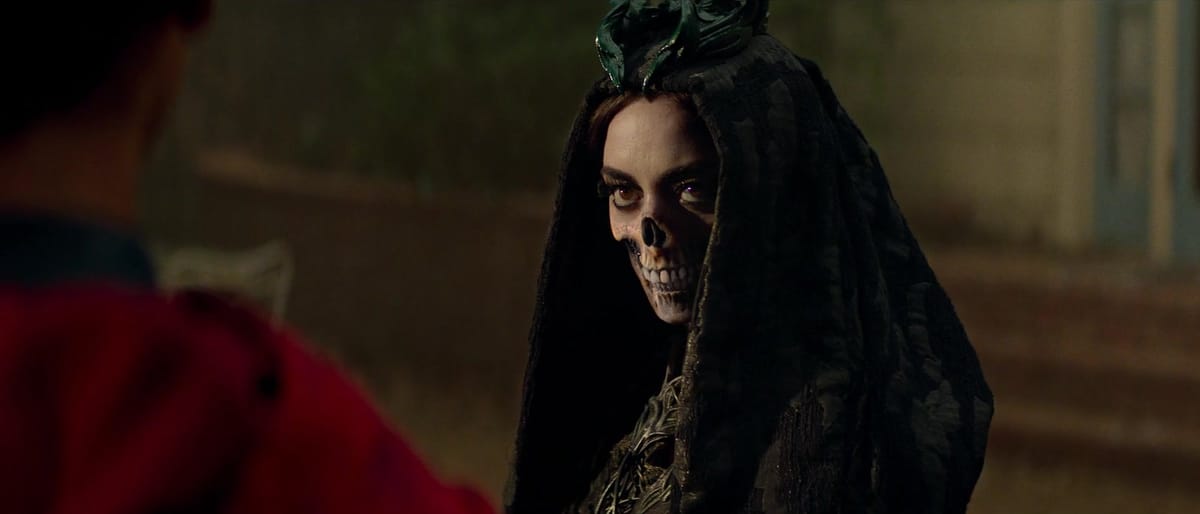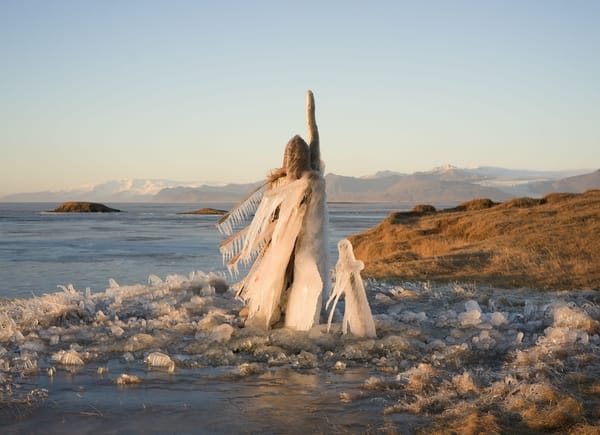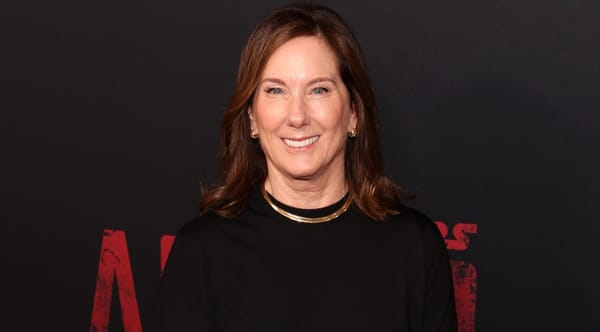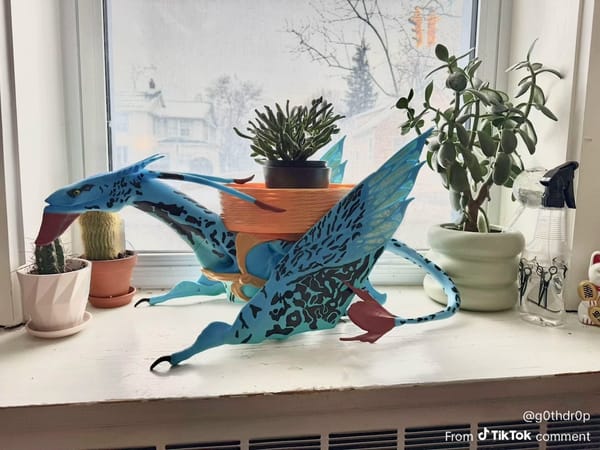The Green Witch
On death

I have, of late, been thinking about death, and not just because she was recently a character on a Marvel television series.
To some very real extent, the premise of my own demise entered the regular cycle of my thoughts in and around 2020. This, in spite of the timing, was more pandemic-adjacent than pandemic-dependent.
Certainly, the arrival of the great global pause may have secured me into whatever passed for my own midlife crisis, given the “wait, what is this for?” reevaluation which everyone seemed to be going through that year anyway, regardless of age.
But the awareness of death also probably would have come to me around then anyway, give or take a year (or a planet-wide disaster). I turned 44. I’d been single for several years, and doing the same job for several years, and in the same community for several years, and all of that time baking sourdough and shitposting on Xitter in the lockdown era just accelerated an overall awareness that I’d reached a new point in the cycle.
By the law of numerical averages, it was the midpoint of my time line, the point at which there might well be fewer days ahead than behind; and that’s if I’m fortunate enough to live roughly as long as my grandparents did, which I may or may not.
I’ve said in the past that my forties have been the best period of my life; that I arrived at some sense of myself, and peace with myself, that had been lacking in the years before. Some sense of grasping fell away. A kind of loving self-awareness set in. Now, here, was the test of this new sense of self: can I retain that peace, now, seeing the end?
It turns out I can. I did. If anything, the sense deepened; the back-of-the-mind perception of the limits of the thing, even (or especially) without the details and dates and what-will-happen-nexts, always there without searching for it, like a rung below my foot on a ladder in the dark. The peace of unknowing.
This time of year is good for it, too, as I sit here writing this; watching the colour fall out of the world and the sun sink lower and lower like a sleepy eyelid. The dying of everything. Halfway into the dark. I do, as noted, prefer the back half anyway; I’ll be damned miserable in January for a lot of reasons, not least because the slow re-awakening does not fill me with anything like the same sense of my place in all things than this moment, right now, as I look out at a greying November sky.
Back to the Agatha All Along of it all, only briefly. Here’s showrunner Jac Shaeffer in The Wrap:
You know, in Episode 7, I wrote the line, “The flow of time is an illusion.” I did some research on time theory, and that came out, and I found that so comforting (laughs). Because I spend a lot of my time worrying I’m using it wrong. I’m procrastinating, or I’m not being present. I’m thinking about other things. I don’t have enough time, or I have too little time. It just, it’s a constant preoccupation and a weight. I think we all experience that, and I think we live in a moment where our attention is pulled all over the place. And yeah, I want to not feel bad about it (laughs).
I want to relax and be like, “It’s all happening all at the same time.” And like, if someone in my life is no longer here, I can visit them in my mind, I can speak to them. There’s this idea that there’s this membrane, this very thin membrane separating everything. And if we can just relax, it becomes transparent.
I wish I could wrap my head around the idea of the flow of time being an illusion, but I think that as an idea — as an intellectual conceit — it’s beyond me.
Better to do the sensing again, with the toe in the dark searching for the next rung on the ladder, because there, I can kind of do it. I can kind of sense the nowness of all things, even only in gasps and snatches; tiny moments when my consciousness snaps back to the present — the infinite nowness — during my daily meditation, or when I suddenly take a deep breath for no reason when I’m out on a walk, as though I’ve just woken from a dream.
The nowness of all things. The peace of unknowing. The ways of letting go, all stacking up.
There were a lot of things about the Agatha All Along finale that I found moving, but one of my favourites is that scene with Alice at the top of episode 8. Alice, if you don’t know, is a protection witch who spent her life haunted by a curse, and a few episodes earlier, she beats the curse (yay!) and then is killed almost immediately (bah!).
In episode 8, we flash back to see Death (who is, as stated previously, a character on this show) come to collect Alice. And Alice says “that’s it? That’s all I get?”
I loved it. So much. I loved it partly because (as a writer) it lampshaded something that (as a fan) I had reacted to, which was the short shrift that the character of Alice seemed to get, getting to “hero out” in episode 5 and then immediately shuffling offstage before she got to do anything with her newly-empowered life. In that moment, Agatha All Along (which is, I feel like noting, an MCU television series based on comic books) made what I believe to be the most mature and important artistic point a story like that can make: yes, sometimes it be like that.
But moreover I loved that scene because it echoed the way I’ve been feeling about my own moment in time when I will step off the edge of the dock, the “oh… already?” of it, no matter how far away it is or how ready for it I am when it comes.
To me, there is such joy, such comfort, in the idea of joining in the second of only two moments that I have in common with all other human beings… and also such joy, such impish delight, in the idea that whenever that moment comes, it will feel like it has come too soon.
We’re narrativized, as a culture. We believe in — and think in — stories; our brains are wired that way. (This leads to the flow of time being an illusion, by the way… or, the flow of time being an illusion leads to this. Chicken, egg.)
But — per Alice — death has no sense of timing. She’s either going to show up too early or too late; we’ll all get cut off in the middle of our story, or long after the story has ended. It will never be right. It will be inconvenient, jarring, stupid, frustrating, sad, wonderful, wondrous, and transcendent all at once. And she’ll be there anyway, taking us away.
She’s a character, that one.
The morning after
On Wednesday, November 6, I had a reasonably full docket of contract work and a genuine feeling that I could power myself through it. If nothing else, it would serve as a means of distracting myself from the results of the American election.
At around 8:30 that morning, though, and following little more than a whim, I put all of my work away and went for a walk instead, finding myself wandering serenely through a perfect late-autumn day in a kind of out-of-body daze.
Part of that, certainly, was shock. It turns out that being able to sit and worry about the worst-case scenario does not, in practice, translate to an in-your-bones acceptance that it will actually happen. When I woke up that morning and saw that headline, I was stunned, and shock works itself out in the body, not the mind.
But part of it my misty mindset was, I hope, the very necessary antidote to the thing, a critical moment of self-care that looked like being in this moment, only, for as long as I could be. Being, exactly, “awake” right then, the state towards which all of my meditation practice is constantly driving, and only occasionally finding.
I was not staying off my phone to avoid all of the anguish on social media; I was staying off it so that I wouldn’t feel compelled to react, or predict, or lament, or (worst) explain any of it.
There are a lot of people in my life, particularly in my family, who ask me to explain to them why things are this way or that way. To boil immeasurably complex drifts of the world down into single-point causes they can understand (or blame).
I’ve lost all patience with it. Later that day, I was reflecting on this article, and that need for certainty and simple explanations, and a lot of the forces I have grappled with in my thinking about where the Western psyche (for surely, it is not just in America) is now. This in particular:
Increase your tolerance for ambiguity and keep increasing your tolerance for uncertainty. We hate uncertainty in this culture.
There is, in fact, a tolerance for ambiguity scale. It was born out of a scale now called the authoritarian personality scale.
Change is necessary. If a system of human beings doesn’t change, they die. And right now I think we’re on the precipice of not wanting to change, and that’s not a good thing. That’s going backward.
Returning for a moment to the practice of meditation, and the Buddhism that undergirds (at least) mine: confronting that basic premise, that all of our lives are fraught with change at all times — that literally nothing is stable, and that our grasping for stability is the cause of our suffering — feels like the deep root of the awareness of, and acceptance of, death that came to me in my 40s.
And I crave certainty, stability, as much as the next primate. I used to be a project manager, for flip’s sake! But I also find myself thinking more and more, not just about death but about time, and the long arc of it, not in the “bends towards justice” sort of way (because honestly, who knows?) nor in the “time is an illusion” way (because honestly, who cares?), but simply in the sheer scale of it, the countless aeons that have come before and will come after, and how microscopic our scale within it is, and therefore, how skewed our every perception of every thing must be.
I was listening to a Ringer podcast last week, and Van briefly detoured to talk about the deaths of pets and how we think about them. This wasn’t exactly his point, but I’ll make it mine: as a cat owner, I live in constant awareness of my cat’s eventual death.
I live this way because, even if only fractionally (against the sheer scale of time itself), his time scale is so much shorter than mine. I picked him up when he was less than 6 months old, still a kitten; and I’ll put him down whenever he passes away, which ideally will be forty years from now, but will (law of averages again) more likely happen in the next decade. I will have seen the whole thing. The whole life. And it was short, and it was forever, and there was so little time, and there was so much of it.
I’d be an idiot not to think that I’m the same thing, just at roughly five times the scale. Short, forever, little, much.
Back to the day after the election. After the quiet walk through morning neighbourhoods picking themselves up and getting off to their days — which was surprisingly long, i.e., my fitness app told me I’d walked fifteen kilometres and not noticed — I started getting on my phone again, mostly to check in on my friends.
Some had already checked in. Some were hours away from doing so. But in one of my group chats, one of my friends and I found ourselves reporting similar states of, if not happiness about any of it, at least, peaceable humility about working with the times we are in.
He spoke of this moment as a reminder, as a jumping-off point, as a place to start focusing more on what is “good and worthwhile in life.” I think — I hope — that’s the track that I’ve already been on, these past five years or more, for which I am profoundly grateful. Halfway there. So little time. So much time.




